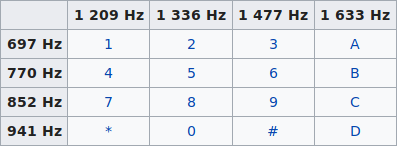(Sorry for my English, I'm not dumb but French. Feel free to make a PR to correct this README.)
You always dreamt to find the phone number dialled by someone in a video? It's now possible! You have to record the audio of the beeps and this script will extract phone numbers from the dial tones.
(If you are on Mac or Windows, go to hell.)
$ git clone https://github.com/ribt/dtmf-decoder/
$ cd dtmf-decoder
$ sudo python3 -m pip install -r requirements.txt --upgrade
$ chmod +x dtmf.py
$ sudo cp dtmf.py /usr/local/bin/dtmf
You have to give a wav file (you can try to convert it with ffmpeg -i audio.mp3 audio.wav for example).
Usage: dtmf [-h] [-v] [-l] [-r] [-d] [-t F] [-i T] file.wav
optional arguments:
-h, --help show this help message and exit
-v, --verbose show a complete timeline
-l, --left left channel only (if the sound is stereo)
-r, --right right channel only (if the sound is stereo)
-d, --debug show graphs to debug
-t F acceptable frequency error (in hertz, 20 by default)
-i T process by T seconds intervals (0.05 by default)
You can test this script with these examples :
$ dtmf perfect-example.wav
0123456789
As you can see it works perfectly, we have a classical French phone number.
$ dtmf not-perfect-example.wav
012374526789
We can guess there is a problem because we have more than ten numbers. So try the verbose output:
$ dtmf -v not-perfect-example.wav
0:00 ...................0
0:01 0..........1111.....
0:02 .....222............
0:03 33........7.......44
0:04 .......5..........2.
0:05 .66666............77
0:06 777.............888.
0:07 ..........99........
0:08 .................
We can guess there are false positives so try to decrease the tolerance:
$ dtmf -v -t 10 not-perfect-example.wav
0:00 ...................0
0:01 0..........111......
0:02 .....222............
0:03 3..................4
0:04 .......5............
0:05 ..66.6..............
0:06 7...............88..
0:07 ...........9........
0:08 .................
The number 6 must have been split into two so the number is 0123456789.
This script is quite simple. We split the signal into frames and we analyse them one by one. We calculate a Fast Fourier Transorm to find its constituent frequencies. We find the frequencies with the bigger amplitude and we compare them with the DTMF's (dual-tone multi-frequency) frequencies.
DTMF keypad frequencies from Wikipedia:
Graph explaining the functioning :

